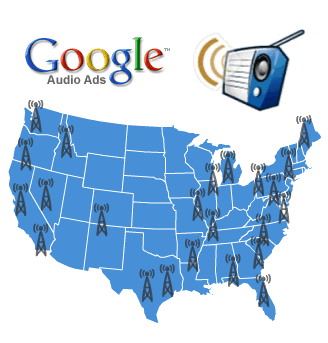If all goes well — which would shock me, because all never goes well for me when it involves a new Internet project — on Monday I will launch my Radio Advertising Advantage.
What is it? That’s not the point.
But someone commented that his company already provides lots of “radio creative” information “for free,” and perhaps it’s not realistic for me to expect radio stations to pay me for stuff they can get elsewhere…for free.
I’ve never seen any of that company’s internal resource sharing program. Maybe it’s great stuff. But I do know that the in-house commercials I hear on that company’s radio stations are…uh…
Well, let’s say they’re just as good as the typical in-house radio commercial one hears all across the U.S.
Which brings me to Google.
 Remember Google Audio Ads?
Remember Google Audio Ads?
If not, don’t feel bad. It was a project at which mighty Google failed mightily.
Basically, advertisers were able to bid on remnant commercial time at stations across the U.S. (Yes, they claimed it wasn’t all “remnant.” Maybe those stations were including sold-out drive time inventory at bargain rates….)
To further help the advertisers, Google offered to match them up with people who would write and produce radio commercials for….oh, say, five or ten bucks. Okay, maybe $25.
This is not the story of why Google failed at radio advertising.
It’s the story of why I’m glad they failed.
Before the plug was pulled on the program, some nice Googlers contacted me. They were interested in developing a “Best Practices” standard for writing & producing radio advertising, to educate the people who were buying those cheap commercials.
Would I help?
Sure I would.
Great, they said. Would I have time to talk to the entire marketing department for Google Audio Ads?
Sure I would.
That department consisted of two women. One once had worked as a radio station account executive. The other had, on occasion, listened to radio.
I spoke with the half of the department that never had worked in radio. She seemed lovely. She believed it was important to offer knowledgeable guidance to their advertising customers.
“We really don’t have a budget for creating a ‘Best Practices’ document,” she said.
“Well,” I said, “that could be a problem.” I’ve been known to donate my time and expertise to worthy causes, but to a company with yearly revenues of $20 billion? Unlikely.
A couple of months passed before we spoke again. “I just wanted to touch base with you,” she said. “We” — she and the former radio station account exec — “created the ‘Best Practices’ ourselves.”
“Really?” I said. “How did you do that?”
“We searched online for articles about how to write radio commercials, and we kind of compiled the best suggestions from all of them.”
Wow.
So a hugely successful company — one of the biggest in the world — places the same value on learning how to create successful radio advertising as do some hugely unsuccessful radio conglomerates:
They’re very interested…
If it’s free.


Comments on this entry are closed.
This story proves the old saying to be as true as it can be: “It takes money to make money.” This story should be the foundation of every radio AE’s pitch to a prospective client.
I’m with Brian on this, and unfortunately, as soon as I began reading the story about your experience with Google I knew how it would end. Regardless of the profitability of the company, it seems that there’s no shortage of people who cannot get past the “short term gain, long term loss” mentality of big business.
There’s another adage which fits very well here, “when you go cheap, you get cheap”. That’s what happened here, and when we’re talking about any form of advertising, going cheap on a regular basis is a recipe for failure… as any Freshman majoring in Marketing will tell you.
What is it about the ease of listening to the radio that people think that it pretty much runs itself and has no champions of it’s own? In my eyes (and ears) radio is the one medium that can be accessed and enjoyed while doing something else eg. driving, washing dishes or mowing the lawn. I’ll admit that not every person in radio is a genius, but the collective of driven individuals that give the industry the integrity it deserves, to as sound good as it does, is one of the reasons that radio still exists, despite the advances in technology since its invention.
Just sayin’…